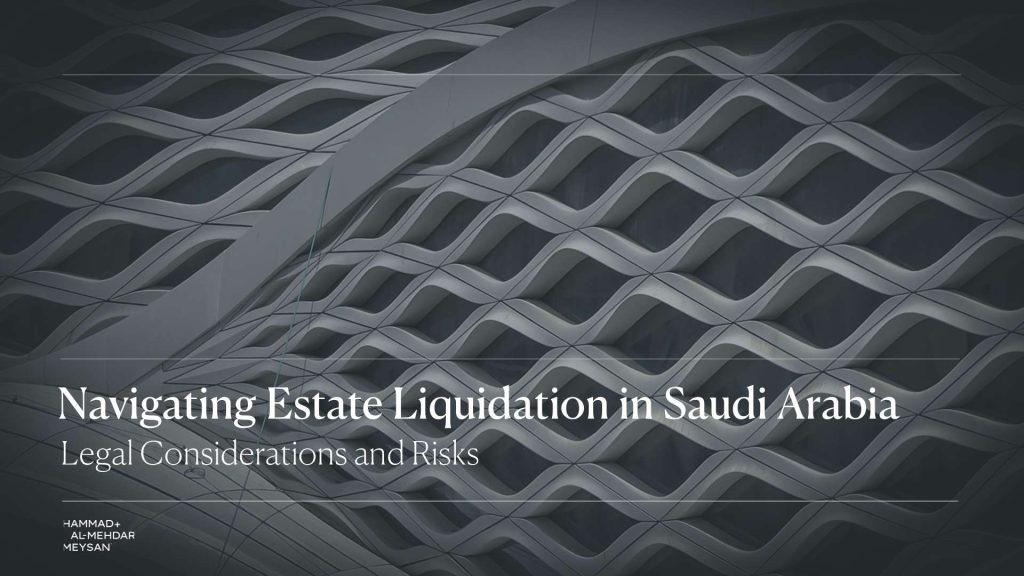
The liquidation of estates in the Kingdom of Saudi Arabia (KSA) is a legally and culturally significant process, rooted in Islamic Sharia and governed by a combination of religious principles and statutory regulations. As personal and commercial assets become increasingly diverse and international, the need for effective estate planning and legal awareness is more critical than ever, particularly for families, business owners, and expatriates operating within the Kingdom.
An Inheritance System Grounded in Sharia Law
Saudi Arabia’s inheritance laws are based on the Hanbali interpretation of Sharia, as codified under the Saudi Personal Status Law. The Personal Status Courts hold jurisdiction over estate matters, and their decisions are guided by fixed Quranic shares, leaving no room for testamentary discretion outside narrowly defined exceptions. This framework applies not only to Saudi nationals but also to foreign residents with assets in the country, making it essential for all individuals with ties to the Kingdom of Saudi Arabia (KSA) to understand the legal implications of death and succession.
Contrary to common law systems, wills in Saudi Arabia are recognised only to the extent that they align with Sharia-mandated inheritance shares. Testamentary freedom is limited, and any provisions that contradict Islamic principles may be deemed unenforceable. This can present challenges for families with international ties or where foreign wills exist.
Why Legal Preparation Matters
Failing to prepare for succession in KSA can result in significant delays, disputes, and financial hardship for surviving family members. Without a formal estate plan or court-validated documentation, heirs may face uncertainty in asset distribution, especially when estates include:
- Commercial interests or business shares
- Jointly owned or indivisible assets
- Properties located in multiple jurisdictions
- Complex debt obligations
Additionally, foreign nationals often underestimate the extent to which local laws apply to them. Even non-Muslims residing in Saudi Arabia are subject to Sharia inheritance rules unless exempted through diplomatic channels or approved bilateral agreements—exceptions that are rare in practice.
Legal Consequences of Inaction
Delays in securing the necessary legal documentation, such as the inheritance deed (Heirs Certificate) or court-issued orders for asset valuation and debt settlement, can paralyse access to the estate. Banks will freeze accounts until they receive court directions. Property cannot be sold or transferred. Business shares remain in legal limbo. In some cases, unresolved debts may result in the judicial liquidation of the estate if liabilities exceed the available assets.
Where disputes arise—whether over asset entitlements, heir eligibility, or valuation discrepancies—matters can escalate to formal litigation. While Saudi courts do encourage mediation, any prolonged conflict places additional emotional and financial strain on grieving families and may permanently damage family business continuity.
Foreign Stakeholders and Cross-Border Complexity
Expatriates and foreign investors often encounter added complications, particularly when estate elements span multiple countries. Coordination with diplomatic missions, validation of foreign death certificates, and the appointment of a local legal representative (wakeel) are standard requirements for this process. When minors or absentee heirs are involved, the court may impose restrictions or supervisory measures to protect their interests, which can further delay the process.
Safeguarding the Future
Given these risks, proactive legal planning is not just advisable—it is essential. Individuals with assets, beneficiaries, or business operations in KSA should consider:
- Reviewing and documenting their estate intentions in line with local laws
- Ensuring all assets are legally registered and updated
- Seeking legal advice to reconcile foreign wills or succession plans with Sharia requirements
- Appointing a local representative to manage proceedings in case of death or incapacity
The liquidation of an estate in Saudi Arabia is not merely an administrative formality—it is a process with profound legal, financial, and familial implications. For both Saudis and expatriates, early legal intervention can protect against future complications and ensure that estate matters are resolved with clarity, compliance, and care.
For individuals or families seeking legal guidance on estate planning or inheritance matters in the Kingdom, our firm provides expert counsel tailored to the unique intersection of Sharia law and modern statutory frameworks.
